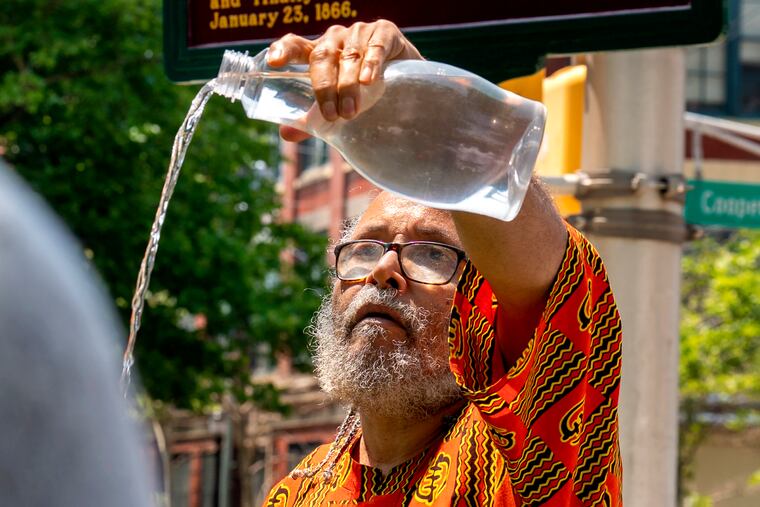‘I give praise to my ancestors’: Camden’s Juneteenth is grounded in spirituality
On Sunday, a group of men and women in Camden held a libation ceremony in front of a historical marker honoring the “Enslaved Africans Once Sold Here.”

With the pulsing beat of a djembe hand drum filling the air, a group of Black men and women in Camden gathered on Sunday afternoon ahead of their Juneteenth festivities to honor their enslaved ancestors and connect with their spirits.
They met in front of the sign at Front and Cooper Streets that read in gold letters, “Enslaved Africans Once Sold Here,” one of the city’s historical markers of its enslavement auction blocks. It’s a reminder that the brutal inhumanity of the slave trade was not limited to Southern states.
“I give praise,” a North Philadelphia man called Brother Ransom repeated over and over in his ceremonial prayer.
» READ MORE: Remembering Camden's ties to slavery with new historical markers
“I give praise to my ancestors, whose blood runs through my veins, yet their names are not known,” he said, recognizing the African people bought and sold to enslavers in not just America, but the Caribbean, South America, and around the world.
The men and women, all dressed in white or Pan-African colors, watched as Ransom finished his opening prayer and lifted a jug of water above his head. He poured some of it into the grass, representing an offering to the spirits of the enslaved who had journeyed to this spot to witness Camden’s small tribute to them.
“When you know your history, you can make an argument for justice,” said R. Mangaliso Davis, founder of the Camden African American Commission and a lifelong community activist.
During the ceremony, he stood next to Ransom and softly struck a metal bowl, layering a rhythmic chime over the drum beat.
Twenty-one years ago, Davis organized the city’s first Juneteenth celebration. He remembers passing out index cards to small businesses and kids that briefly explained how Juneteenth celebrates the end of enslavement in the United States, by marking the day when the Union army arrived in Galveston, Texas, to enforce the Emancipation Proclamation in 1865.
Juneteenth’s profile has grown substantially since Davis brought the celebration to the city. Seeing it recognized as a federal holiday in 2021 and watching nearby cities and suburban towns grow their own Juneteenth celebrations has made him happy.
“I feel good that a lot of people are getting [it], doing it, expanding on it,” he said.
New Jersey alone had more than 12,000 enslaved people by 1800, and Camden served as the waypoint for traffickers along the Delaware River. The state agreed to gradual abolition by 1804, the last of the Northern states to begin that process, but enslavement was not officially banned until the state ratified the 13th Amendment in 1866.
After the libation ceremony in Camden finished, Davis packed up his things. He was heading over to Farnham Park, where Camden’s Juneteenth would soon begin its daylong festivities with music, food, and celebration. They planned to do another libation ceremony there, too, so more adults and children could join in their tribute.
“These people were citizens, they weren’t slaves. They were forced into slavery,” he said.
“We gotta tell that history to people.”